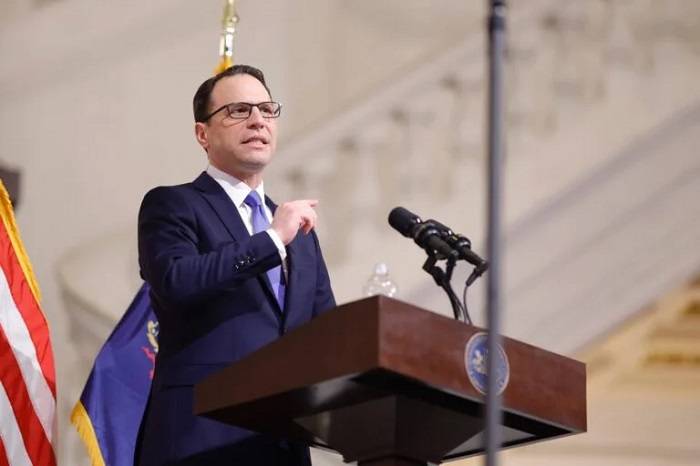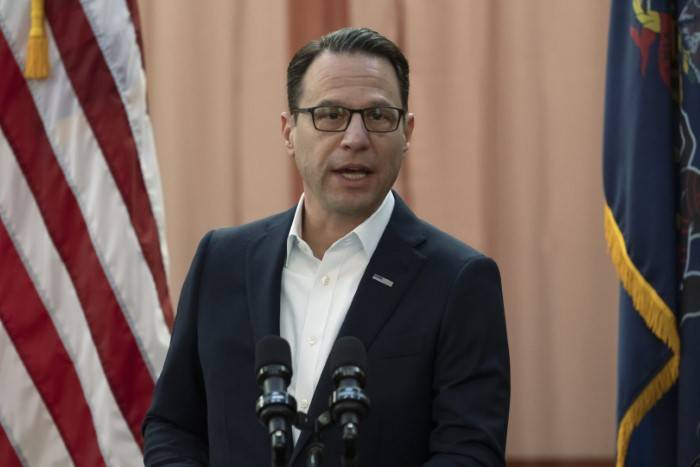Josh Shapiro, the current Governor of Pennsylvania, has become a prominent figure in American politics due to his dynamic approach and progressive strategies. Known for his dedication to public service and commitment to justice, Shapiro’s career spans various roles, from Attorney General to Governor, where he has implemented innovative policies to improve the lives of Pennsylvanians. This comprehensive guide explores his age, political strategies, performance, and the benefits his leadership brings to the state and beyond.
Age and Early Life

Josh Shapiro was born on June 20, 1973, making him 51 years old as of 2024. Raised in Montgomery County, Pennsylvania, Shapiro developed an interest in public service from a young age. His upbringing in a Jewish family, where the values of justice, community, and service were emphasized, significantly influenced his career path. He attended the University of Rochester, where he earned a degree in political science, and later graduated from Georgetown University Law Center with a law degree.
From his early years, Shapiro displayed a keen sense of leadership and dedication to civic duty, serving in various capacities that laid the foundation for his political career. His age, while reflective of a seasoned career, also positions him as a leader with a balance of experience and a forward-looking vision for Pennsylvania.
Political Strategies
Josh Shapiro’s political strategies are marked by a blend of progressive ideals and pragmatic governance. His approach often centers on inclusivity, transparency, and proactive engagement with the community. Here are some key strategies that define his political playbook:
- Community Engagement and Transparency: Shapiro believes in staying connected with the constituents. His strategy includes holding town hall meetings, open forums, and using social media platforms to maintain a direct line of communication with the public. This approach not only builds trust but also ensures that policy decisions are informed by the needs and opinions of the people he serves.
- Bipartisan Collaboration: Despite his progressive stance, Shapiro has demonstrated a commitment to bipartisan collaboration. He understands that lasting policy changes require support across the political spectrum. By fostering relationships with both Democratic and Republican lawmakers, Shapiro has been able to pass significant legislation that benefits a wide range of Pennsylvanians.
- Focus on Justice and Equality: As a former Attorney General, Shapiro has a strong background in law enforcement and justice. His strategy involves rigorous advocacy for reforms in criminal justice, education, and healthcare to ensure that all citizens, regardless of background, have equal opportunities. His focus on justice is evident in his policies aimed at reducing systemic inequalities and promoting fair practices.
- Economic Development and Innovation: Shapiro’s economic strategy includes fostering innovation, supporting small businesses, and investing in infrastructure. He has pushed for policies that encourage technological advancements and sustainability while ensuring that economic growth benefits all sectors of society, particularly underserved communities.
- Environmental Protection: Understanding the importance of environmental stewardship, Shapiro has advocated for robust environmental protections. His strategy includes supporting renewable energy initiatives, enhancing conservation efforts, and combating climate change through state-level policies.
Performance as Governor
Josh Shapiro’s performance as Governor of Pennsylvania has been widely recognized for its effectiveness and impact. Since taking office, he has implemented several key initiatives that have contributed to the state’s progress across various sectors. Here’s an overview of his performance in some critical areas:
- Healthcare: One of Shapiro’s early achievements as governor was the expansion of Medicaid, which increased healthcare access to thousands of Pennsylvanians. His administration has also focused on combating the opioid crisis through comprehensive strategies involving prevention, treatment, and recovery services.
- Education: Shapiro has been a strong advocate for public education, pushing for increased funding and reforms that prioritize student success and equity. His administration has worked to reduce disparities in school funding and enhance the quality of education across the state.
- Criminal Justice Reform: Building on his experience as Attorney General, Shapiro has pursued meaningful reforms in the criminal justice system. His efforts include advocating for changes in sentencing laws, promoting alternatives to incarceration, and supporting reentry programs for formerly incarcerated individuals.
- Economic Growth: Under Shapiro’s leadership, Pennsylvania has seen significant economic growth. His administration has focused on creating jobs through investments in infrastructure and technology, supporting small businesses, and promoting workforce development initiatives.
- Environmental Initiatives: Shapiro’s commitment to the environment is evident in his policies aimed at reducing carbon emissions and protecting natural resources. He has supported initiatives that promote clean energy, reduce pollution, and ensure sustainable development practices.
- COVID-19 Response: Shapiro’s handling of the COVID-19 pandemic demonstrated his ability to lead in crisis situations. His administration implemented comprehensive public health measures, including vaccine distribution and economic relief programs, which were pivotal in managing the state’s response to the pandemic.
Benefits of Josh Shapiro’s Leadership

Josh Shapiro’s leadership style and policies have brought numerous benefits to Pennsylvania and its residents. Here are some of the key benefits associated with his governance:
- Improved Healthcare Access: Through the expansion of Medicaid and other health initiatives, more Pennsylvanians have access to affordable healthcare services. This has improved overall health outcomes and reduced the burden on emergency services and hospitals.
- Economic Stability and Growth: Shapiro’s focus on economic development and job creation has contributed to a stable and growing economy. By investing in infrastructure and supporting innovation, he has created an environment conducive to business growth and sustainability.
- Enhanced Education System: Increased funding and reform efforts have strengthened Pennsylvania’s education system, ensuring that students receive quality education regardless of their socio-economic background. This has led to better educational outcomes and opportunities for the youth.
- Criminal Justice Reforms: Shapiro’s efforts in criminal justice reform have led to a fairer legal system in Pennsylvania. By focusing on rehabilitation and reducing recidivism, his policies contribute to safer communities and a more just society.
- Environmental Protection and Sustainability: With a strong focus on environmental issues, Shapiro’s leadership has positioned Pennsylvania as a leader in sustainable practices. His policies have promoted clean energy, conservation, and climate resilience, benefiting both the environment and the economy.
- Community Trust and Engagement: By prioritizing transparency and community engagement, Shapiro has built a strong rapport with Pennsylvanians. This trust has enabled his administration to implement policies more effectively and respond to the needs of the people.
Challenges and Criticisms
While Josh Shapiro has achieved significant success as Governor, his tenure has not been without challenges and criticisms. Some of the key challenges he faces include:
- Balancing Progressive and Conservative Interests: As a leader committed to bipartisan cooperation, Shapiro often finds himself navigating between progressive demands and conservative opposition. This balancing act can sometimes slow down policy implementation and lead to compromises that may not fully satisfy either side.
- Economic Inequality: Despite economic growth under his leadership, Pennsylvania continues to grapple with economic inequality. Addressing the root causes of this issue requires long-term strategies and policies that can be challenging to implement in a politically divided environment.
- Healthcare Costs: While Shapiro has expanded healthcare access, the rising cost of healthcare remains a concern. Finding ways to control costs while maintaining quality and accessibility is an ongoing challenge.
- Environmental Controversies: Some of Shapiro’s environmental policies have faced pushback from industries that argue the regulations are too restrictive and could harm economic growth. Balancing environmental protection with economic interests remains a contentious issue.
Related Post:
A Comprehensive Guide to George W. Bush: Age, Strategies, Performance, and Benefits
Al Attles: A Comprehensive Guide to His Strategies, Performance and Benefits
Tony West: A Comprehensive Guide to Their Strategies, Performance and Benefits
Josh Shapiro’s tenure as Governor of Pennsylvania highlights his commitment to public service, justice, and progressive governance. His age and experience bring a fresh perspective to leadership, while his strategies emphasize inclusivity, justice, and economic growth. Under his leadership, Pennsylvania has seen significant improvements in healthcare, education, economic stability, and environmental protection.
However, like any leader, Shapiro faces challenges that test his ability to balance competing interests and navigate a complex political landscape. Despite these challenges, the benefits of his leadership are evident in the positive changes experienced by Pennsylvanians. As he continues to lead, Shapiro’s focus on community engagement and progressive policies is likely to shape the future of Pennsylvania for years to come.


